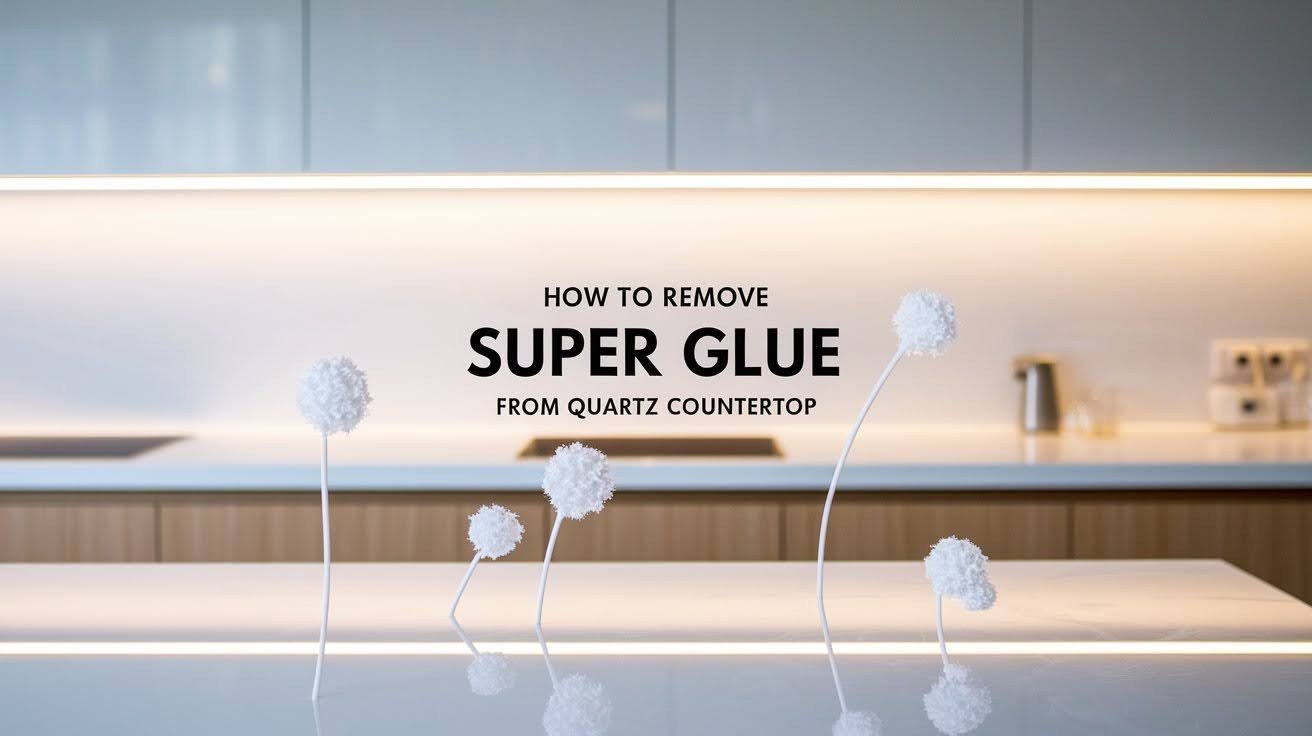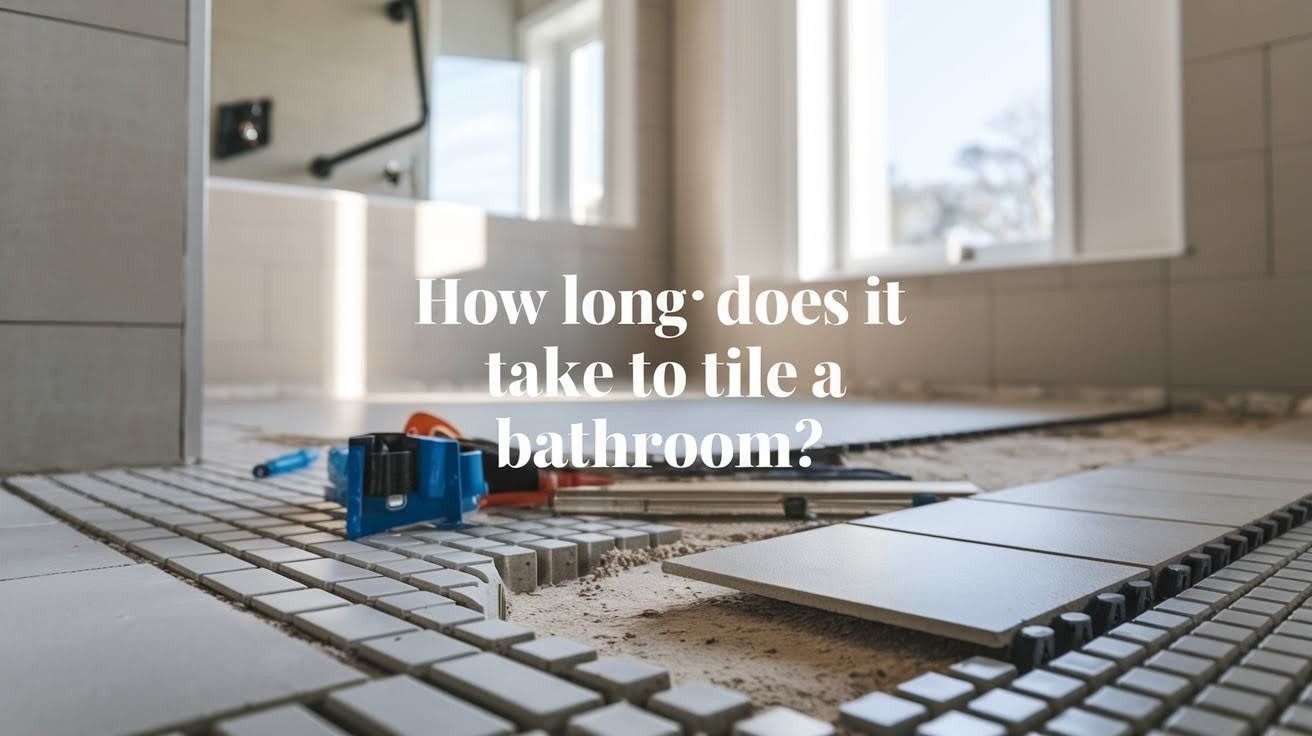Super glue on your quartz countertop can feel like a big problem. But don’t panic – you can fix this mess without ruining your beautiful surface.
The key is acting fast and using the right method. With simple tools you already have at home, you can get that stubborn glue off safely. The trick is being gentle while still being effective.
This guide will show you exactly how to remove super glue from a quartz countertop without scratches or damage. You’ll learn the safest steps, what materials work best, and how to protect your counter in the future. Your quartz will look perfect again in no time.
Materials You’ll Need
Having the right supplies makes learning how to remove super glue from a quartz countertop much easier. Gather these items before you start working.
- Plastic scraper or old credit card
- Cotton pads or soft cloths
- Warm towels
- Isopropyl alcohol (70% or higher)
- Mild dish soap
- Acetone (if needed, use carefully)
Never use these items on quartz: razor blades, steel wool, abrasive cleaning pads, or scented nail polish remover. Heat guns and hair dryers can also cause problems by expanding the quartz too quickly.
Step-by-Step Method for Quartz Countertops
This proven method works on most super glue spills without harming your quartz surface. Follow each step carefully for the best results.
Protect the Surrounding Area
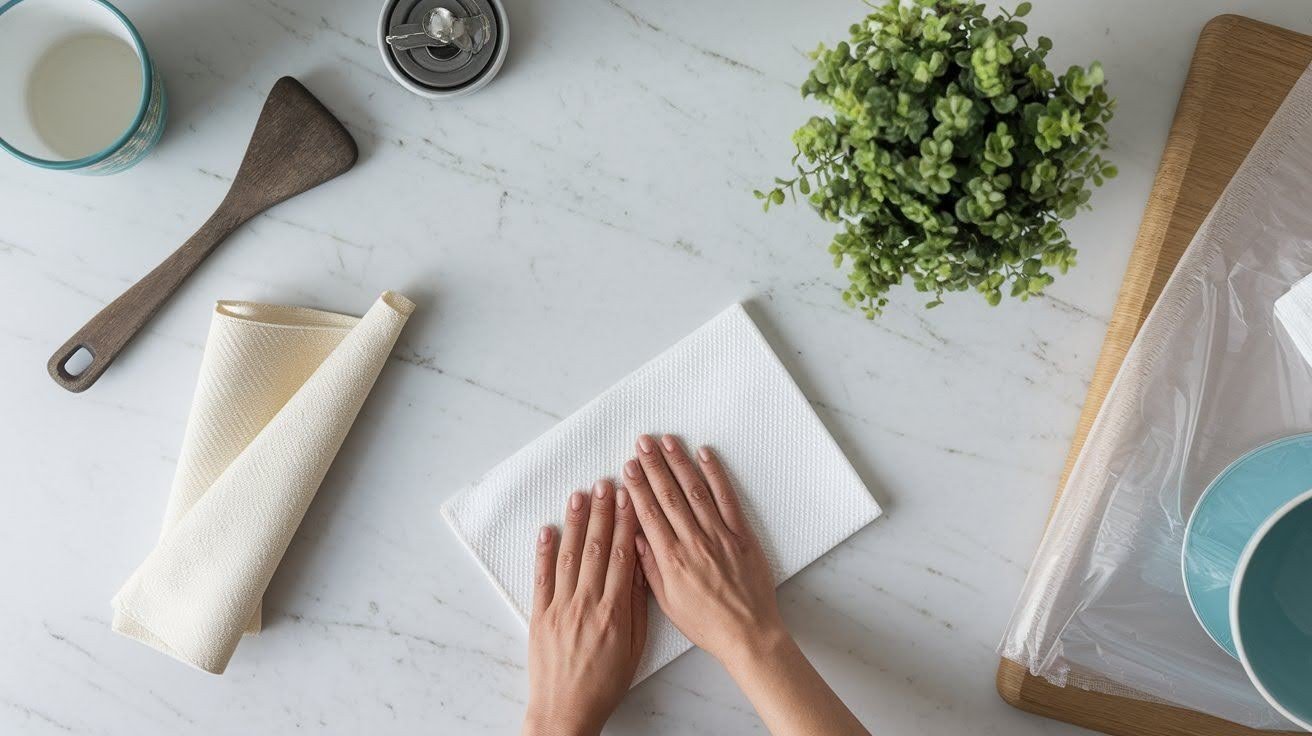
Before you start removing glue, take a moment to shield the countertop space around the spot. Place a soft cloth, paper towel, or plastic sheet nearby so any cleaning solution or tool you use won’t affect other parts of the quartz. This simple precaution helps avoid scratches or stains.
It’s also a good idea to clear the area of small kitchen items like dishes, jars, or appliances. Having an open space makes it easier to focus on the glue spot and reduces the chance of accidentally knocking something over.
Preparing the area properly saves time and effort later. By protecting the surroundings first, you’ll make the cleaning process safer, cleaner, and more effective.
Soften the Glue with Warm, Soapy Water

Soaking a cloth in warm, soapy water is a gentle way to soften hardened glue on quartz. The warmth helps break down the bond, while the soap works to loosen any sticky residue without being harsh on the surface.
Placing the damp cloth directly over the glue for 5-10 minutes allows the moisture and heat to penetrate, making the glue more pliable. This step reduces the need for forceful scraping, which could risk scratching your countertop.
By taking a little extra time with this method, you make the cleanup process much easier. The glue becomes easier to lift off, and your quartz surface stays safe from unnecessary damage.
Gently Lift the Edges
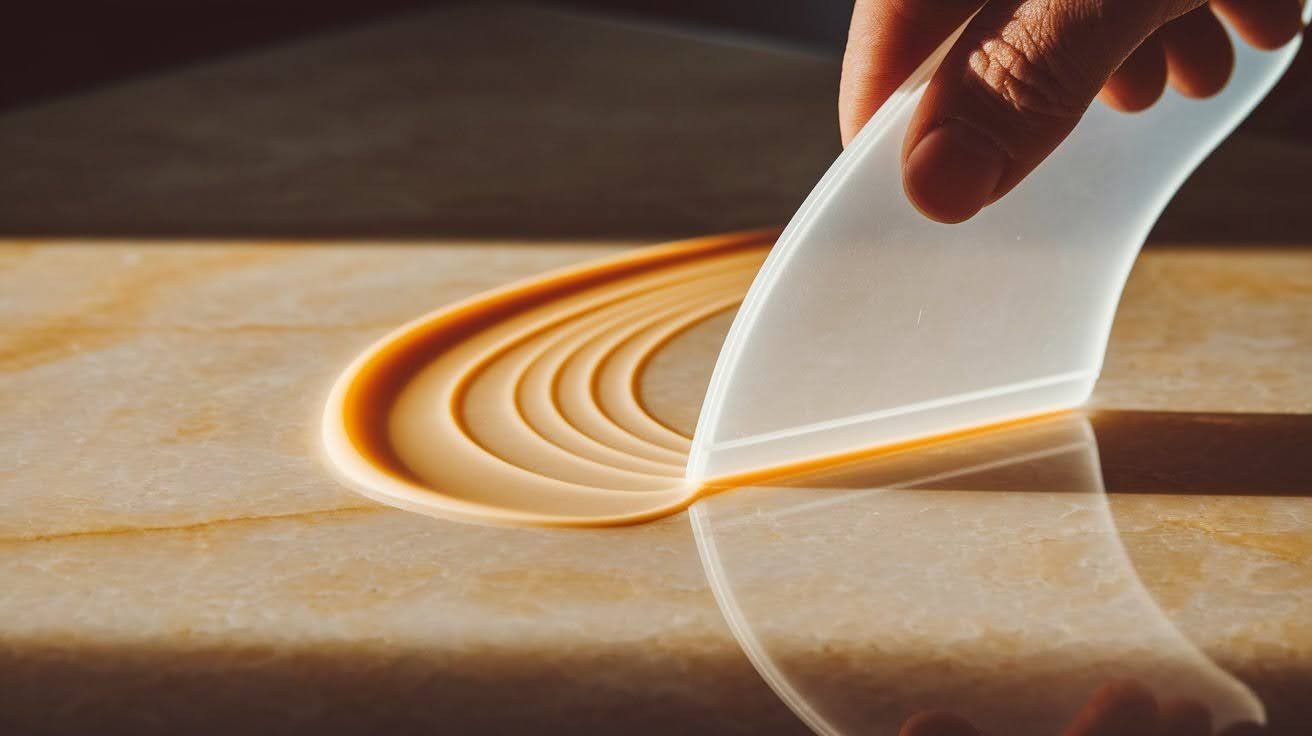
Once the glue has softened, carefully start lifting the edges with a plastic scraper or your fingernail. Using gentle pressure ensures you target only the glue without scratching the quartz surface. Patience here is key to keeping the countertop safe.
Work slowly around the edges rather than trying to remove the whole spot at once. By loosening little by little, you reduce the risk of chipping or leaving marks behind. Avoid using sharp metal tools, as they can easily damage the surface.
This step may take a few extra minutes, but it’s worth the effort. Gentle lifting protects the countertop’s shine while helping you get closer to a completely clean, smooth finish.
Use Rubbing Alcohol for Stubborn Spots
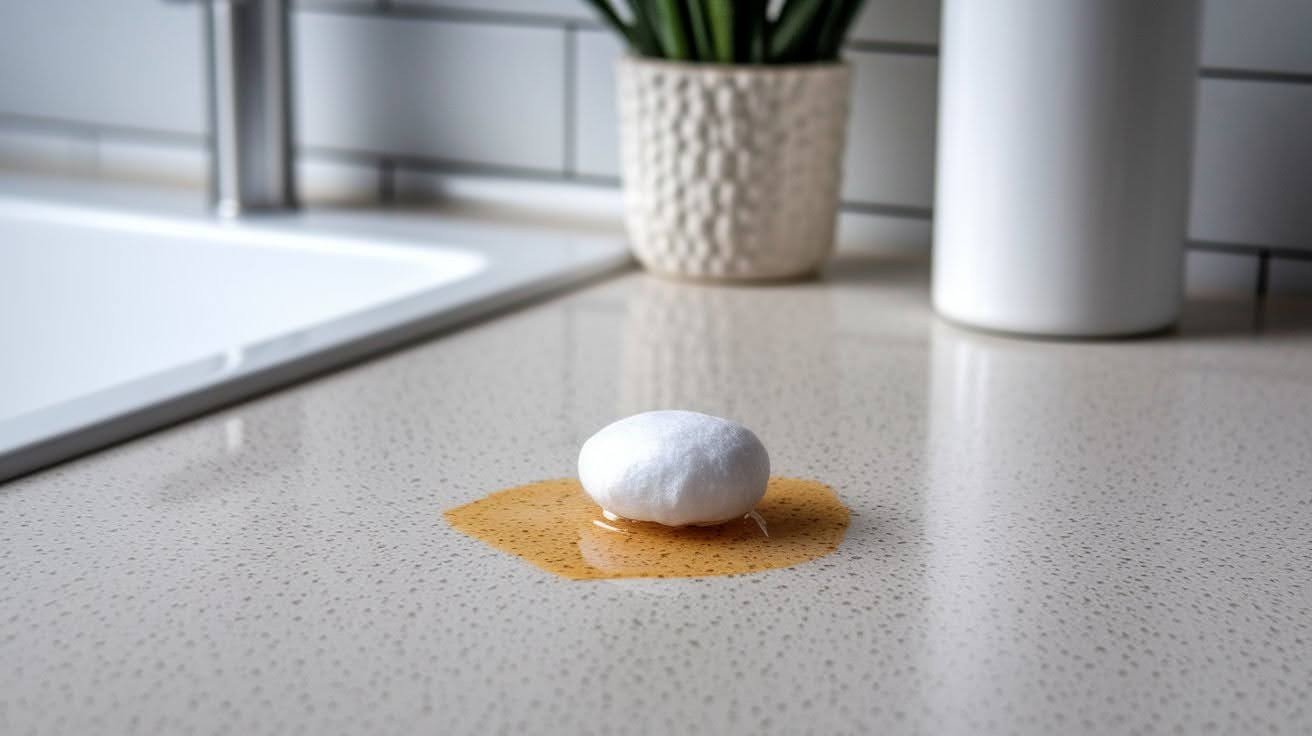
If some glue remains after soaking and lifting, rubbing alcohol can help dissolve it without harming the quartz. Dampen a soft cloth or cotton ball with alcohol and gently dab it onto the stubborn spot to break down the residue.
Allow the alcohol to sit on the glue for a minute or two. This gives it time to penetrate and loosen the hardened material, making it easier to wipe away without using excessive force.
After the glue softens, gently rub or lift it off with the cloth or a plastic scraper. This method safely removes persistent spots while keeping your countertop smooth and undamaged.
Remove Any Sticky Residue

After lifting the main glue spot, there may still be a thin, sticky layer left on the surface. Use a soft cloth dampened with warm, soapy water to gently rub the area, breaking down any remaining adhesive.
For tougher residue, a small amount of rubbing alcohol or a gentle countertop-safe cleaner can help. Apply it sparingly and rub in circular motions to avoid scratching the quartz.
Once the sticky layer is gone, wipe the area with a clean, damp cloth to remove any cleaning solution. Dry the surface thoroughly to restore the countertop’s smooth, polished finish.
Give the Countertop a Final Clean
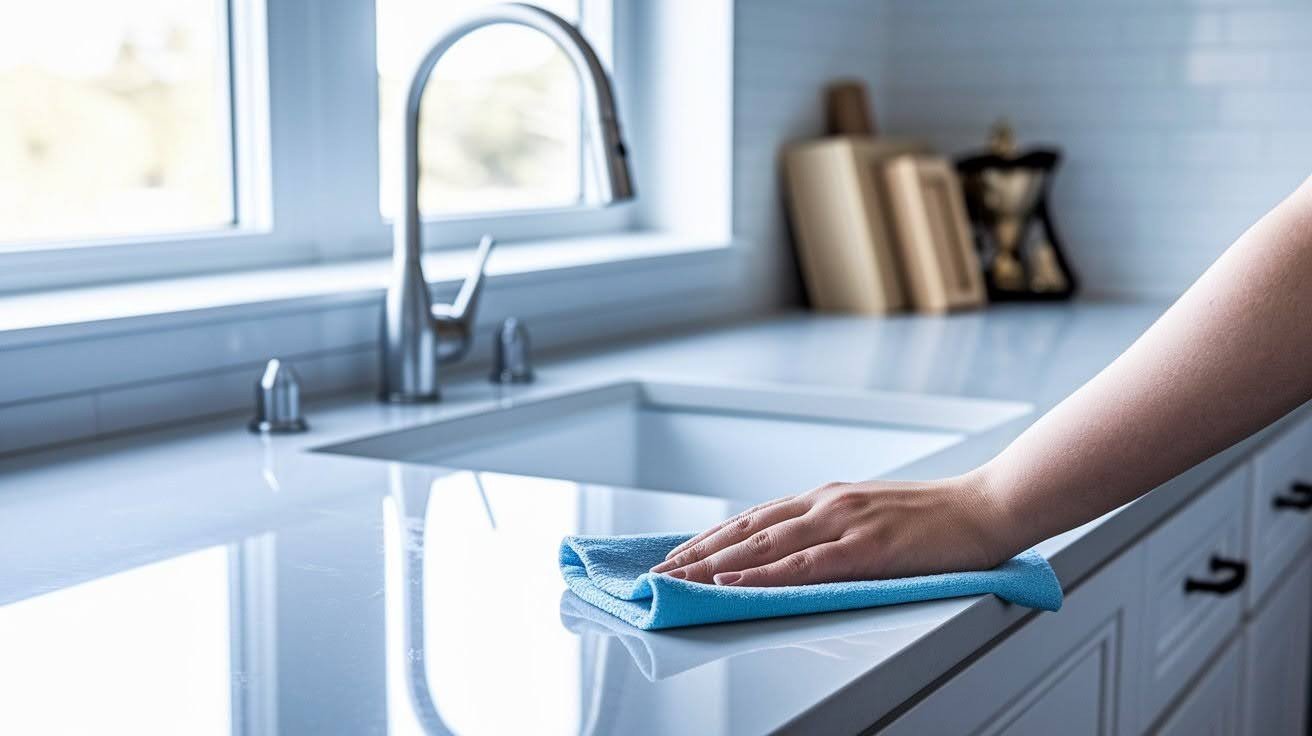
After all glue and residue have been removed, it’s important to give your quartz countertop a final clean. Use a soft cloth with warm, soapy water to wipe the entire area, ensuring no leftover particles or cleaner remains.
Rinse the cloth and wipe again with plain water to remove any soap traces. This step helps restore the countertop’s natural shine and keeps the surface looking fresh and spotless.
Finally, dry the area thoroughly with a clean, dry cloth. A proper final clean prevents streaks or water spots and leaves your quartz countertop smooth, polished, and ready for daily use.
Prevent Future Spills
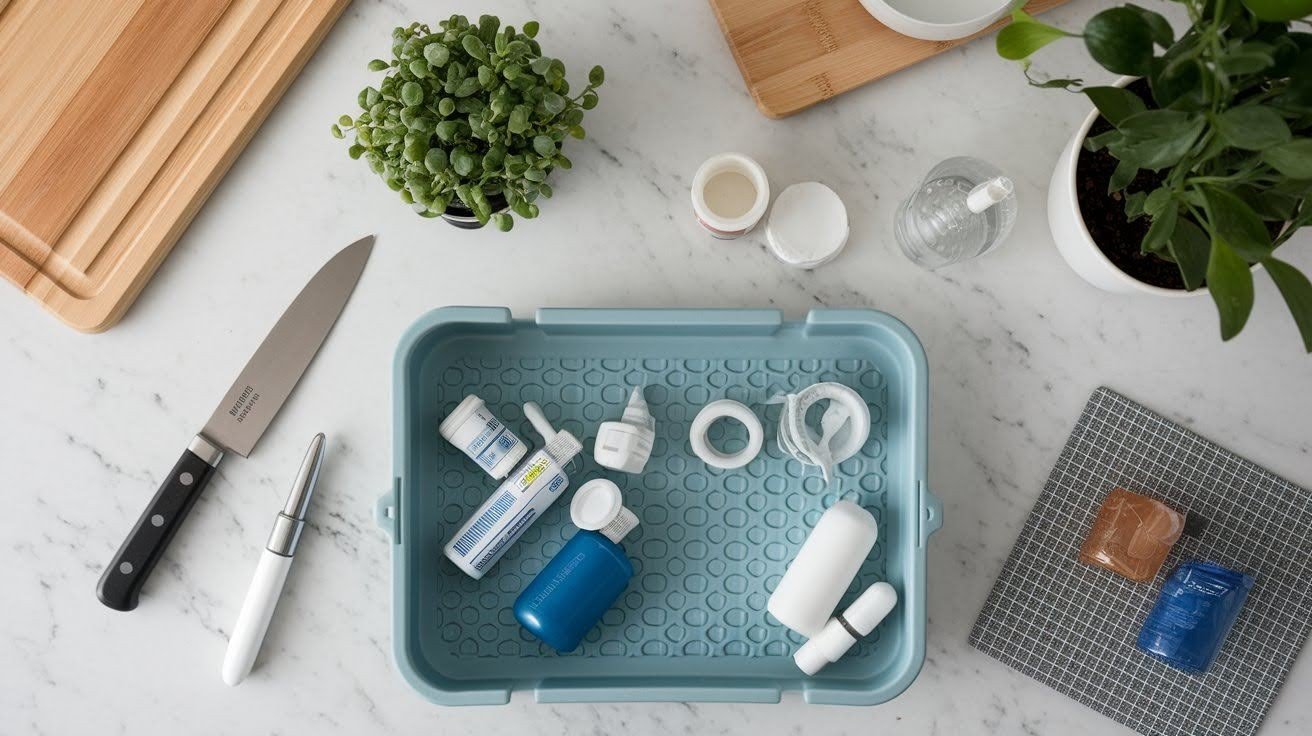
To avoid future glue accidents, create a designated workspace when using adhesives. Use a cutting board, tray, or protective mat to catch any drips, keeping your quartz countertop safe.
Clean up spills immediately rather than letting them dry. Quick action prevents glue from hardening and becoming difficult to remove, saving you time and effort later.
Consider storing glue and other sticky materials away from countertop areas when not in use. Keeping these items organized and out of reach reduces the chance of accidental spills and helps maintain your countertop’s pristine condition.
Why Quartz Requires Special Care?
Quartz countertops are tough but not indestructible. They resist stains and heat better than many other materials, but they can still get damaged if you’re not careful.
The surface is non-porous, which means spills don’t soak in like they do with granite. This makes cleaning easier, but it also means you need to be gentle with your cleaning methods.
Harsh chemicals or rough scraping can dull the shine or create tiny scratches. Once damaged, quartz is expensive to repair or replace, so prevention is always your best bet.
Conclusion
The safest way to remove super glue from a quartz countertop is to soften the glue, scrape gently, and use isopropyl alcohol with care. This method works for most spills without causing damage.
Quartz is built to last, but treating it gently keeps it looking new for years. Always test cleaners first and use plastic tools instead of metal ones.
Prevention beats cleanup every time. Use protective mats when working with adhesives, and clean spills quickly before they set completely.
With the right approach, you can restore your quartz countertop’s smooth, polished look without worry. Your kitchen will be back to normal, and you’ll know exactly what to do if this happens again.
Frequently Asked Questions
Can acetone damage quartz countertops?
Acetone is generally safe on quartz if used sparingly and wiped away quickly. Always test in a hidden spot before applying it directly. Avoid letting it sit too long, as prolonged contact can dull the finish or weaken sealants.
How long should I wait before scraping super glue off quartz?
For best results, place a warm, damp towel over the glue for 10-15 minutes before scraping. This softens the adhesive, making removal easier and safer. Rushing the process can cause scratches or unnecessary pressure on your quartz surface.
What’s the safest solvent for removing super glue from quartz?
The safest choice is isopropyl alcohol (70% or higher). It’s less harsh than acetone yet effective at loosening dried glue. Apply gently with a cotton pad or cloth and wipe clean. This method protects quartz while removing adhesive safely.
Will super glue permanently stain my quartz countertop?
No, super glue won’t permanently stain quartz because quartz is non-porous. The glue hardens on top rather than soaking in. With the correct removal method, softening, scraping, and solvent cleaning, you can restore your quartz surface without lasting marks or damage.
Should I use heat to remove super glue from quartz?
Avoid direct heat like hair dryers or heat guns, as they can cause cracks from thermal shock. Instead, use only gentle warmth by placing a damp towel over the glue. This controlled approach softens the adhesive without risking quartz damage.

